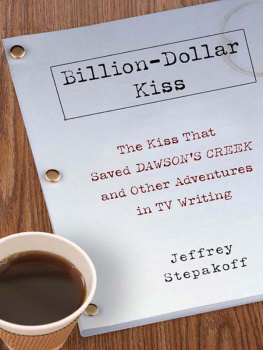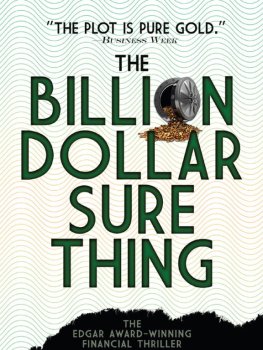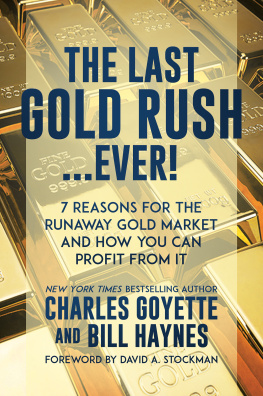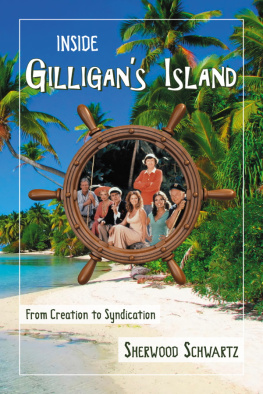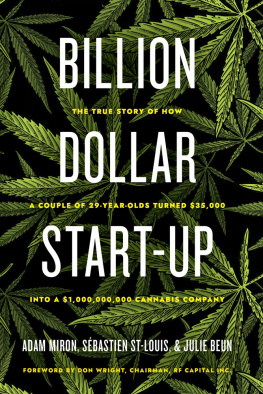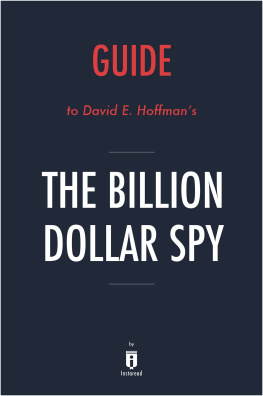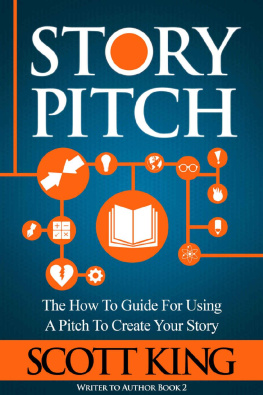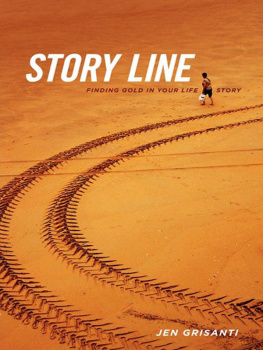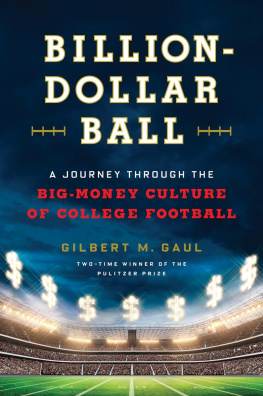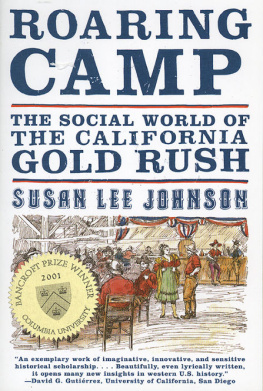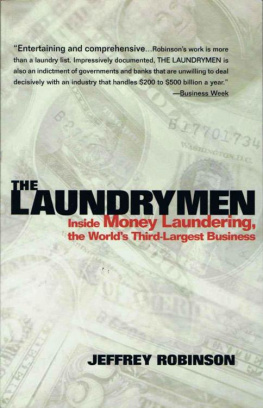Billion-Dollar Kiss
T HE K ISS T HAT S AVED D AWSONS C REEK AND O THER A DVENTURES IN TV W RITING
Jeffrey Stepakoff

GOTHAM BOOKS
Published by Penguin Group (USA) Inc.
375 Hudson Street, New York, New York 10014, U.S.A. Penguin Group (Canada), 90 Eglinton Avenue East, Suite 700, Toronto, Ontario M4P 2Y3, Canada (a division of Pearson Penguin Canada Inc.); Penguin Books Ltd, 80 Strand, London WC2R 0RL, England; Penguin Ireland, 25 St Stephens Green, Dublin 2, Ireland (a division of Penguin Books Ltd); Penguin Group (Australia), 250 Camberwell Road, Camberwell, Victoria 3124, Australia (a division of Pearson Australia Group Pty Ltd); Penguin Books India Pvt Ltd, 11 Community Centre, Panchsheel Park, New Delhi110 017, India; Penguin Group (NZ), 67 Apollo Drive, Mairangi Bay, Auckland 1311, New Zealand (a division of Pearson New Zealand Ltd); Penguin Books (South Africa) (Pty) Ltd, 24 Sturdee Avenue, Rosebank, Johannesburg 2196, South Africa
Penguin Books Ltd, Registered Offices: 80 Strand, London WC2R 0RL, England
Published by Gotham Books, a division of Penguin Group (USA) Inc.
Copyright 2007 by Jeffrey Stepakoff
All rights reserved
Gotham Books and the skyscraper logo are trademarks of Penguin Group (USA) Inc.
LIBRARY OF CONGRESS CATALOGING-IN-PUBLICATION DATA
Stepakoff, Jeffrey.
Billion-dollar kiss: the kiss that saved Dawsons Creek and other adventures in TV writing / by Jeffrey Stepakoff.
p. cm.
ISBN: 978-1-1012-1690-3
1. Stepakoff, Jeffrey. 2. Television writersUnited StatesBiography. I. Title.
PN1992.4.S785A3 2007
808.2'25dc22
[B] 2006102541
Without limiting the rights under copyright reserved above, no part of this publication may be reproduced, stored in or introduced into a retrieval system, or transmitted, in any form, or by any means (electronic, mechanical, photocopying, recording, or otherwise), without the prior written permission of both the copyright owner and the above publisher of this book.
The scanning, uploading, and distribution of this book via the Internet or via any other means without the permission of the publisher is illegal and punishable by law. Please purchase only authorized electronic editions, and do not participate in or encourage electronic piracy of copyrighted materials. Your support of the authors rights is appreciated.
While the author has made every effort to provide accurate telephone numbers and Internet addresses at the time of publication, neither the publisher nor the author assumes any responsibility for errors, or for changes that occur after publication. Further, the publisher does not have any control over and does not assume any responsibility for author or third-party Web sites or their content.
F OR E LIZABETH, OF COURSE
AUTHORS NOTE
L ook, nobody writes a book like this without a little trepidation. Ill explain in greater detail later about exactly why I wrote this. But for now, I want you to understand that this is something I felt I had to do. Believe me, I enjoy watching The Donald fire wannabe execs just as much as most. I see the entertainment value in American Idol. But when these shows, and the likes of The Bachelor and Wife Swap and Are You Hot? consistently became the principal offerings from the handful of international conglomerates that control nearly everything we see on TV, I realized it was time to say something.
I came to Hollywood and started writing for television in 1988. That was right about where and when an explosion started, what can really only be described as a modern-day gold rush. The deregulation and consolidation of the media industry, along with record-breaking syndication revenues, fueled a virtual mania for scripted entertainment that quite literally made the TV writer one of the hottest commodities of our generation. The studios fought with one another for the opportunity to throw money at us. It was wild.
But every mania has a dark side. In 2001, the television business hit the skids, reality TV replaced scripted programming as the predominant form of television, and Sony, one of the worlds biggest studios and my employer at the time, fired many of its TV executives and folded its network television production division. My position as a coexecutive producer on Dawsons Creek and working for Sony during this revolutionary time gave me a front-row seat to the upheaval in Hollywood.
Now, in order to fully appreciate this unreported chapter in the Hollywood story, you have to understand TV writers, our lives, and what it is precisely that we do. So along with a frank, ringside account of the rise and falland, I think, rebirthof TV, I have set out to take you into our world. I have written in great detail about our craft, not what I learned in school, but what I learned on the set and in the story room. Ill take you to those places, as well as pitch meetings and casting sessions and backstage on shows you know and love. Ill share with you what it feels like to see your name on the screen, to see stories taken from your lifeyour personal Wonder Years performed for tens of millions of people all around the globe. Ill take you behind the scenes and into a world where high-powered careers, entire networksbillions of dollarsride on the fleeting whim of a twentysomething writer.
This is a tale few know, fewer talk about, and no one writes about. I do not claim to present an entirely objective or exhaustive history of Hollywood. My account is a personal one. This is the story of television, the story of the television writer, and this is also my story.
Jeffrey Stepakoff
April 2007
Mr. Sarnoff next gave a little talk, in which he cheerfully, and with enormous self-effacement, admitted that the real problem of television was not its mechanical vagaries but finding programs for it when it finally gets ironed out.
E. B. W HITE, The New Yorker , 1936
CNN Reporter: A clich in Hollywood is She was so dumb she slept with the screenwriter theyre at the bottom of the totem pole. Do you think thats still true?
Robert McKee: If I were an aspiring actress trying to get ahead today, Id sleep with a TV writer.
CNN, 2004
ONE
Billion-Dollar Kiss
Content is king.
S UMNER RE DSTONE
I n 1999, at the end of a summer that was hot even by L.A. standards, I sat in the story room with the other Dawsons Creek writers and tried to keep my panic in check. When you write one-hour TVfeeding the massive apparatus that produces a $2.5 million mini-movie every six days, day in and day outyou are certainly accustomed to round-the-clock doses of heart-thumping, stomach-churning, no-way-in-hell-will-we-make-the-deadline anxiety. But the panic that gripped the writing staff on Dawsons Creek this particular day was a special kindan unforgettable kind.
To say that the show was starting to sink would be polite; at this point at the beginning of Season Three, we were already deep, deep, underwater. When I was hired onto the writing staff a few weeks earlier, Dawsons Creek was the hottest show on television. Oh, word was out around town that The Creek was a crazy place to work and Dawsons was a nightmare, beware! But every writer heard those decrees about every show in town. I mean, unless you were lucky enough to work for Phil Rosenthal on Everybody Loves Raymond , nicknamed by writers as Everybody Loves Everybody, you knew youd inevitably put up with a certain amount of insanity if you took a staff gig. That was a given. But the truth is, I had no idea what I was signing up for. I dont think any of the writers really did.

